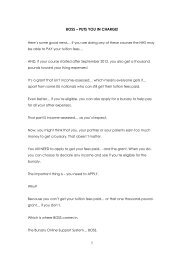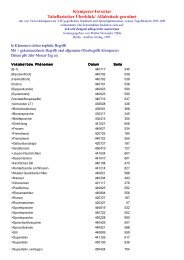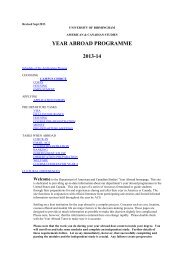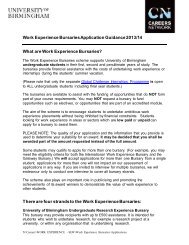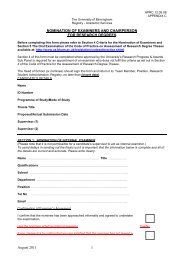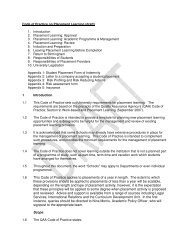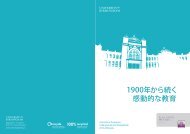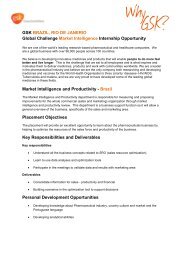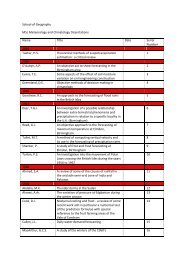What's the difference? - University of Birmingham
What's the difference? - University of Birmingham
What's the difference? - University of Birmingham
Create successful ePaper yourself
Turn your PDF publications into a flip-book with our unique Google optimized e-Paper software.
14 The <strong>Birmingham</strong> Magazine<br />
Sports news<br />
The ironman nutritionist<br />
Ironman champion, academic and nutritionist to<br />
elite athletes including Ethiopian marathon runner<br />
Haile Gebrselassie, Pr<strong>of</strong>essor Asker Jeukendrup<br />
is far removed from <strong>the</strong> image <strong>of</strong> a sports scientist<br />
in a lab coat.<br />
In training: Asker prepares for a triathlon with alumna and Ironman World Champion Chrissie Wellington<br />
Director <strong>of</strong> <strong>the</strong> Human Performance Lab in<br />
<strong>the</strong> School <strong>of</strong> Sport and Exercise Sciences,<br />
Pr<strong>of</strong>essor Jeukendrup’s research is focused on<br />
what athletes should eat and drink to achieve<br />
optimum performance. He <strong>of</strong>ten uses his own<br />
experiences to raise key questions, competing<br />
in Ironman triathlons, comprising a 2.4-mile<br />
swim, a 112-mile bike ride and a 26.2-mile<br />
run, to test his body to its limits.<br />
‘I’ve made it my mission not just to research<br />
but to translate science into something more<br />
practical. A lot <strong>of</strong> people do research and a<br />
lot <strong>of</strong> people work with athletes but <strong>the</strong>re’s<br />
a big gap between <strong>the</strong> two and a huge need<br />
to bridge that gap,’ he says.<br />
<strong>of</strong> sports drink hourly to achieve this. The<br />
research found that carrying and consuming<br />
sports gels alongside sports drinks was an<br />
effective way <strong>of</strong> improving performance.<br />
Chelsea Football Club, cyclist Lance<br />
Armstrong, Ironman champion Chrissie<br />
Wellington (BSc Geography, 1998) and more<br />
regular clients have all received nutritional<br />
advice from Asker and he enjoys meeting <strong>the</strong><br />
different challenges that each presents.<br />
‘If you compare <strong>the</strong> nutritional needs <strong>of</strong><br />
someone competing in an Ironman race to<br />
someone who may be a bit overweight and<br />
goes to <strong>the</strong> gym a couple <strong>of</strong> times a week<br />
<strong>the</strong>re’s a totally different focus,’ he says. ‘In<br />
one case it’s about how to get enough energy<br />
in, in <strong>the</strong> o<strong>the</strong>r it’s about encouraging someone<br />
to manage what <strong>the</strong>y eat and drink.’<br />
On visits to Ethiopia to advise Haile<br />
Gebrselassie, Gete Wami and o<strong>the</strong>r marathon<br />
runners on nutrition, he has been amazed with<br />
<strong>the</strong>ir level <strong>of</strong> training. ‘They train so hard that<br />
when it comes to doing a race <strong>the</strong>y find it<br />
easy,’ he says. ‘Working with elite athletes<br />
is like working with Formula 1 cars, it’s about<br />
fine tuning to find out how you can make <strong>the</strong><br />
engine perform better. They’re also a really<br />
good model for understanding how <strong>the</strong> human<br />
body works and <strong>the</strong> influences <strong>of</strong> exercise<br />
and training, meaning my research can <strong>of</strong>ten<br />
be applied to treating obesity and diabetes.’<br />
• In <strong>the</strong> 2008 Research Assessment Exercise,<br />
a UK-wide quality survey, Sport and Exercise<br />
Sciences research at <strong>Birmingham</strong> was rated<br />
as world-leading and ranked equal first<br />
in <strong>the</strong> country.<br />
Learn more<br />
www.liveweb137.bham.ac.uk<br />
This unique approach to research was<br />
recognised in 2005 when he became <strong>the</strong><br />
<strong>University</strong>’s youngest pr<strong>of</strong>essor at <strong>the</strong> age <strong>of</strong><br />
35. His previous projects include studying <strong>the</strong><br />
amount <strong>of</strong> carbohydrate an athlete needs to<br />
take on board during an endurance race such<br />
as <strong>the</strong> Tour de France or London Marathon.<br />
Around 90g <strong>of</strong> carbohydrate per hour is<br />
required during <strong>the</strong>se events but an athlete<br />
would need to drink about a litre-and-a-half<br />
Elite athletes: Ethiopian marathon runners in training


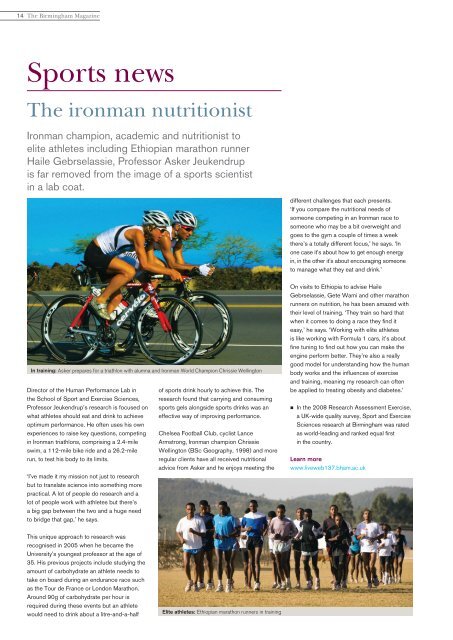
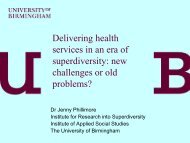
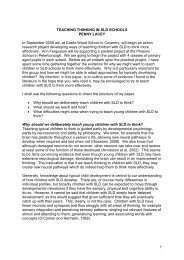
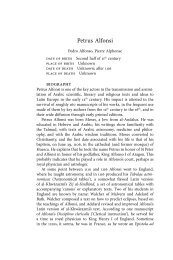
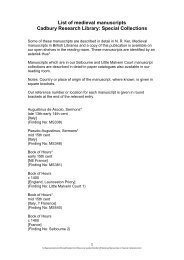
![Benyamin Asadipour-Farsani [EngD Conference abstract]](https://img.yumpu.com/51622940/1/184x260/benyamin-asadipour-farsani-engd-conference-abstract.jpg?quality=85)
